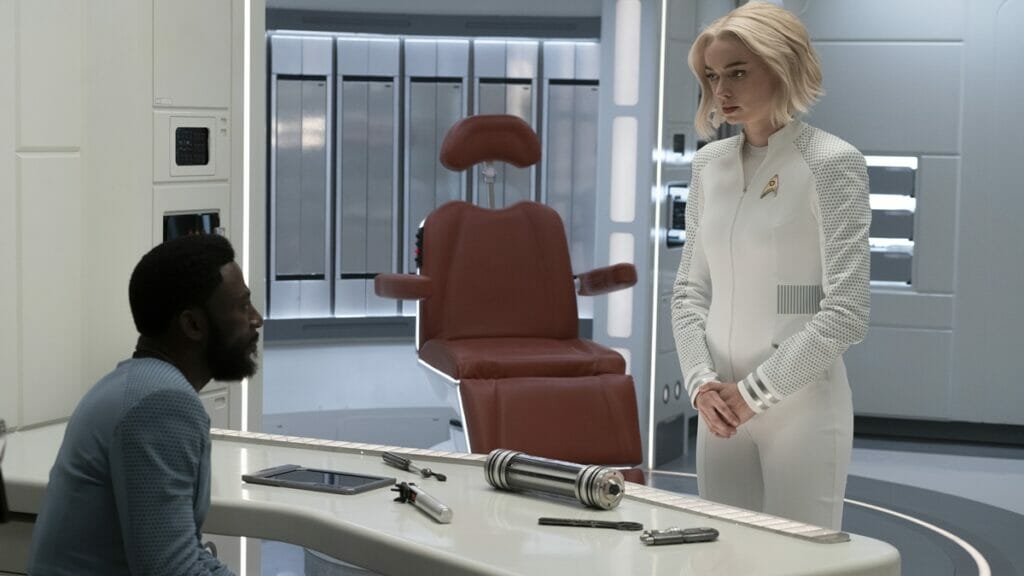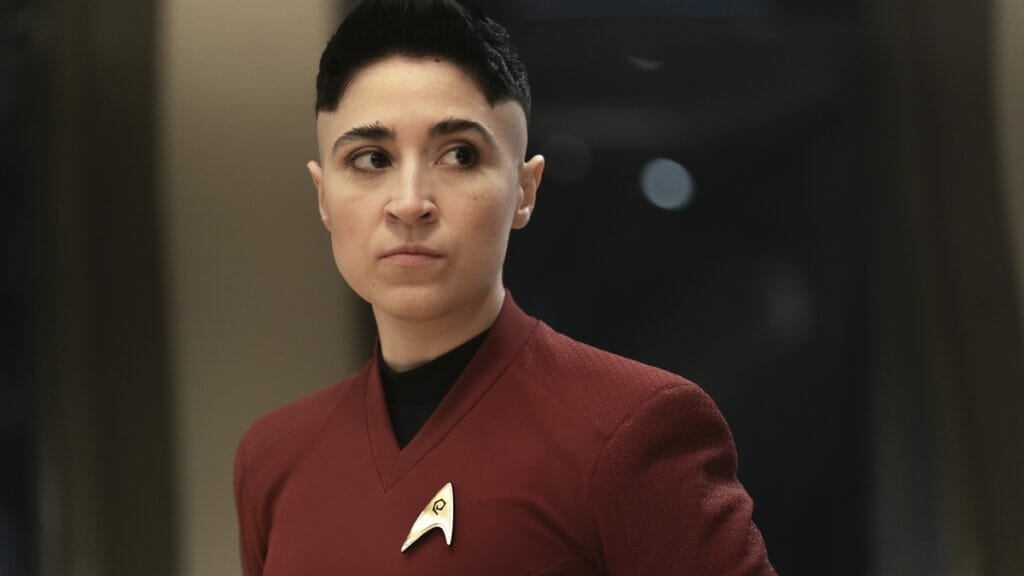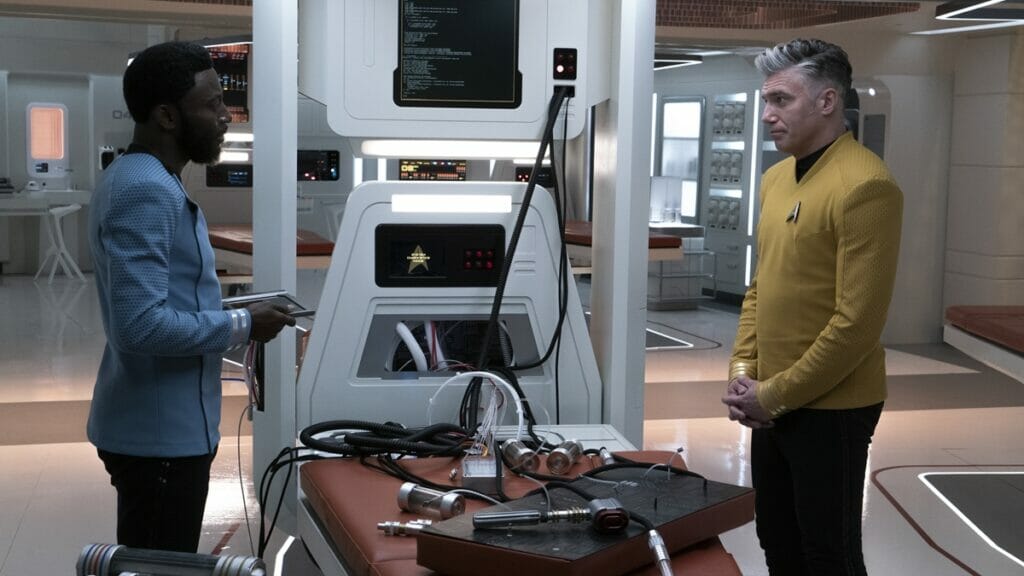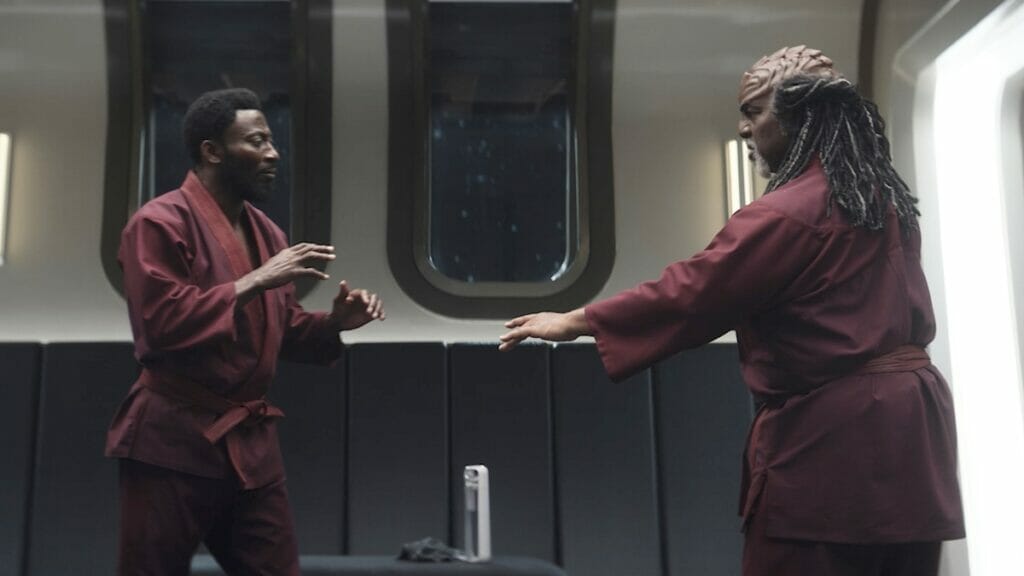Read also:
How to Watch FX Live Without CableHow To Watch AMC Without CableHow to Watch ABC Without CableHow to Watch Paramount Network Without CableA visit from a reformed Klingon general-turned-ambassador stirs Dr. M’Benga to confront his lingering scars as a wartime medic and more.
War is a complex thing. Recovering from it is that much more complicated and uncertain. Strange New Worlds embraces that complexity in “Under the Cloak of War,” and it’s the episode’s greatest strength.
The episode doesn’t try to soften or simplify the combustible blend of optimism and pragmatism forced to mingle in that crucible. Instead, it attempts to acknowledge the challenges and justifications on both sides of the debate. And it countenances how experiencing war’s brutality can turn an idealistic view of forgiveness and progress into a luxury not everyone can afford.
Those issues come to a head when Ambassador Ra (Robert Wisdom) comes aboard the USS Enterprise. Ra is a Klingon defector known for his brutality and war crimes in the conflict with the Federation that consumed the first season of Star Trek: Discovery. Since then, however, he’s become a decorated advocate for peace and embraced the Federation and its values. His presence on the ship stirs up old memories for Nurse Chapel (Jess Bush), Lt. Ortegas (Melissa Navia), and most of all, Dr. M’Benga (Babs Olusanmokun), all of whom fought in that war and knew Ra’s reputation and cruelty firsthand.
 Paramount+)" class="wp-image-43359"/>
Paramount+)" class="wp-image-43359"/>The episode’s core is a philosophical, and eventually physical, conflict between Ambassador Ra and the other veterans on board. On one side is a very Starfleet notion of high-minded reconciliation. Ra may be the infamous “Butcher of J’Gal,” but he has since reformed. He admitted to his crimes and now wants to atone by helping others avoid such needless suffering across the galaxy. Captain Pike himself (Anson Mount) stands in as a representative of the idea that whatever sins Ra may have committed in the past, embracing him now serves the causes of redemption and peace that lie at the heart of the Federation.
But on the other side are people who witnessed the horrors and atrocities committed by Ra and those like him and cannot bear to forgive or erase them in the name of a utilitarian good. M’Benga, Chapel, and Ortegas can barely stand to be in the same room with the ambassador after what they witnessed in the theater of war. Idealistic (if pragmatic) pronouncements about the good he’s done for so many civilizations since that time cannot help but fall on deaf ears when his crimes are a visceral memory rather than a distant abstraction.
The clash between those viewpoints plays like the culmination of themes Star Trek has been working through for decades. How to weigh the acts of a penitent butcher has been with the franchise since “The Conscience of the King” from The Original Series. The thematic thrust of The Undiscovered Country is whether peace with Klingons is possible despite years of hostilities. The question of whether to trust someone who stood on the wrong side of the battle lines is of a piece with “The Defector” from The Next Generation. M’Benga’s struggles with Ra mirror Neelix’s struggles with the author of his own people’s massacre in Voyager’s “Jetrel.”
The complexity of that, examining the stains to the soul good people must endure amid war and the uniqueness of that sin, is laudable and piercing.
Most of all, examining the costs of war and whether those involved can ever fully recover from it was an abiding question at the heart of Deep Space Nine. The same themes took hold in early triumphs like Kira’s experience in “Duet” and ran through the moral complications of the Dominion War that carried the series to the finish.
“Under the Cloak of War,” then, plays like the worthy inheritor of so much groundwork laid by its predecessors. It takes the ideas swirling around those other stories and channels them through its live clashes of ideology and perspective. From there, the episode finds new, gutting illustrations and intricacies for the hard issues at play that advance those ideas for the here and now.
The smartest choice SNW makes is to channel those issues through Dr. M’Benga. This episode is a showcase for Olusanmokun and his finest hour in the series to date. Even if it had solely relied on a true but well-trodden “war changes people” core message, it still could have succeeded on the strength of the acting alone. He, Bush, and Navia convey the barely restrained anger at Ra, the lurking ghosts of their time in the field, and the rigors of PTSD beautifully.
 Paramount+)" class="wp-image-43358"/>
Paramount+)" class="wp-image-43358"/>The same goes for the writing, with the way the fraught diplomacy in the present is interlaced with the memories of war in the past. The choice to explore M’Benga and Chapel’s time in the Starfleet equivalent of a MASH unit is a canny one. (And not just because it gives us Clint Howard’s latest Star Trek cameo.) Seeing the characters reflect on such horrors in dialogue is one thing. It’s quite another to actually see the harrowing circumstances that help viscerally convey why these experiences left such an indelible mark on them.
The flashback accounts for things the audience has already seen and puts them into a new context. The implicit trust and shorthand between Nurse Chapel and Dr. M’Benga emerge from their time together in the wringer of J’Gal. “Protocol 12”, the problematic Starfleet fight milk the two of them gassed up with in the season premiere, has its origins as a wartime stimulant. Even M’Benga’s practice of keeping his terminally ill daughter in stasis has its roots in the good doctor doing the same for tough medical cases during the war.
But the flashbacks also explain why M’Benga and the others have such trouble letting go and accepting Ra as a new man. As wartime medics, they saw the worst consequences of the conflict brought to their doorstep without warning. They witnessed friends, civilians, and even children slaughtered with no hope for their care to do any good. They saw young ensigns, saved through their resourceful ingenuity and inspired by words of comfort from the doctor, sent back for suicide runs into General Ra’s war machine.
 Paramount+)" class="wp-image-43360"/>
Paramount+)" class="wp-image-43360"/>How could they not be scarred by that? How could they forgive, let alone forget, such monstrousness? They can’t.
And yet, the best and most interesting part of the episode isn’t its simple yet palpable “war is hell” takeaway. It is the idea that the gravest, or at least most durable, tragedy of war is that it forces men and women to sacrifice their souls in the fog of war and become monsters themselves in the process. The violent acts they must perpetrate in the name of keeping those they love safe wound them as much as the crimes they must witness from their enemies. That is M’Benga’s curse, one that haunts him to this day.
Strange New Worlds isn’t the first to make that observation. But it’s powerful and soulful at the same time when channeled through M’Benga’s plight. He tells the young patched-up ensign that they fight so that those at home can one day enjoy peace, and their hope is not to come back changed from what that fight requires of them. M’Benga is a former black ops soldier who, like Ra, gave up his acts of violence in the same way, holding onto his soul despite the brutality of war.
It is the sort of murky moral gray area that Deep Space Nine specialized in and that Strange New World revives with credibility and conviction.
And in the shadow of that, his greatest beef with Ra is not the unspeakable acts the Klingon committed, but rather the acts Ra’s crimes provoked M’Benga to commit himself in response. The personal and psychological lines Joseph had to cross are what haunt him, and it’s where his deepest scorn for Ra persists. The complexity of that, examining the stains to the soul good people must endure amid war and the uniqueness of that sin, is laudable and piercing.
The pain is heightened when Ra himself takes credit for the bloody consequences of M’Benga’s choices. The episode lacks much in the way of grand stakes or any sort of ticking clock — a bold choice. Instead, the closest thing to immediate narrative tension comes from the question of whether Ambassador Ra has genuinely changed or if he’s secretly hiding the same warrior’s bloodlust he showed on the battlefield.
The answer is a gob-smacking subversion. Though Ra’s infamous for killing his men to escape the battlefield, it was, in fact, M’Benga who assassinated Ra’s subordinates, grimly falling back into the violence he’d tried so hard to leave behind. Contrary to the whispers, Ra showed less viciousness, not more, than rumored, out of a belief that the story of someone who left the Klingon quest for conquest on moral principle would do more good for the cause of peace than the truth.
 Paramount+)" class="wp-image-43361"/>
Paramount+)" class="wp-image-43361"/>It is the sort of murky moral gray area that Deep Space Nine specialized in and that Strange New World revives with credibility and conviction. Which is better, to forgive a war criminal for the sake of peace for all peoples or to exact justice in the name of those who unduly suffered at their hands? What is right, to own up to the truth of horrors inflicted directly and indirectly, or to use a lie to help see that they don’t happen again? Who’s correct when one officer believes in the aspirational, redemptive principles that undergird Starfleet, and another has witnessed the hellfire in which those principles cannot always find purchase?
“Under the Cloak” of war commendably offers no answers to those difficult questions. Even when the philosophical conflict turns into a fight and a slaying that leaves Ra dead at M’Benga’s hands, it chooses to let the audience sit with the moral ambiguity rather than take a firm side.
Instead, Strange New Worlds acknowledges a simple truth. There are those who have been marked by war and those who have blessedly been able to avoid its devastating compromises. Neither is wrong in the ethical debates or practical choices and that follow. But the one can never truly understand the other. They cannot see through the eyes that have witnessed that horror. Nor can they know the feeling of hands that have taken grim part in it, despite their fervent, futile hope not to come home changed from it.